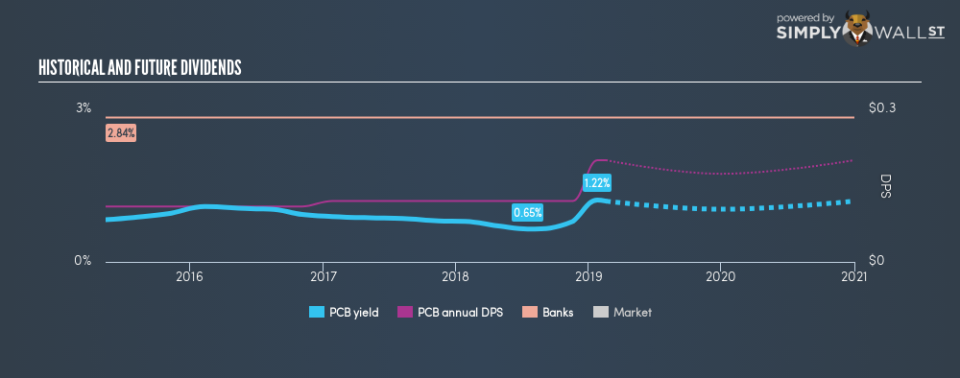Is Pacific City Financial Corporation (NASDAQ:PCB) A Good Dividend Stock?

Want to participate in a short research study? Help shape the future of investing tools and receive a $20 prize!
A sizeable part of portfolio returns can be produced by dividend stocks due to their contribution to compounding returns in the long run. Pacific City Financial Corporation (NASDAQ:PCB) has paid a dividend to shareholders in the last few years. It currently yields 1.2%. Should it have a place in your portfolio? Let’s take a look at Pacific City Financial in more detail.
View our latest analysis for Pacific City Financial
How I analyze a dividend stock
Whenever I am looking at a potential dividend stock investment, I always check these five metrics:
Is its annual yield among the top 25% of dividend-paying companies?
Has its dividend been stable over the past (i.e. no missed payments or significant payout cuts)?
Has dividend per share risen in the past couple of years?
Does earnings amply cover its dividend payments?
Based on future earnings growth, will it be able to continue to payout dividend at the current rate?
How does Pacific City Financial fare?
Pacific City Financial has a trailing twelve-month payout ratio of 7.1%, meaning the dividend is sufficiently covered by earnings. Going forward, analysts expect PCB’s payout to increase to 11% of its earnings. Assuming a constant share price, this equates to a dividend yield of 1.1%. However, EPS is forecasted to fall to $1.67 in the upcoming year. Therefore, although payout is expected to increase, the fall in earnings may not equate to higher dividend income.
When considering the sustainability of dividends, it is also worth checking the cash flow of a company. A business with strong cash flow can sustain a higher divided payout ratio than a company with weak cash flow.
If there is one thing that you want to be reliable in your life, it’s dividend stocks and their constant income stream. Unfortunately, it is really too early to view Pacific City Financial as a dividend investment. It has only been consistently paying dividends for 4 years, however, standard practice for reliable payers is to look for a 10-year minimum track record.
In terms of its peers, Pacific City Financial produces a yield of 1.2%, which is on the low-side for Banks stocks.
Next Steps:
After digging a little deeper into Pacific City Financial’s yield, it’s easy to see why you should be cautious investing in the company just for the dividend. But if you are not exclusively a dividend investor, the stock could still be an interesting investment opportunity. Given that this is purely a dividend analysis, I recommend taking sufficient time to understand its core business and determine whether the company and its investment properties suit your overall goals. Below, I’ve compiled three fundamental factors you should further research:
Future Outlook: What are well-informed industry analysts predicting for PCB’s future growth? Take a look at our free research report of analyst consensus for PCB’s outlook.
Valuation: What is PCB worth today? Even if the stock is a cash cow, it’s not worth an infinite price. The intrinsic value infographic in our free research report helps visualize whether PCB is currently mispriced by the market.
Dividend Rockstars: Are there better dividend payers with stronger fundamentals out there? Check out our free list of these great stocks here.
We aim to bring you long-term focused research analysis driven by fundamental data. Note that our analysis may not factor in the latest price-sensitive company announcements or qualitative material.
If you spot an error that warrants correction, please contact the editor at editorial-team@simplywallst.com. This article by Simply Wall St is general in nature. It does not constitute a recommendation to buy or sell any stock, and does not take account of your objectives, or your financial situation. Simply Wall St has no position in the stocks mentioned. On rare occasion, data errors may occur. Thank you for reading.

